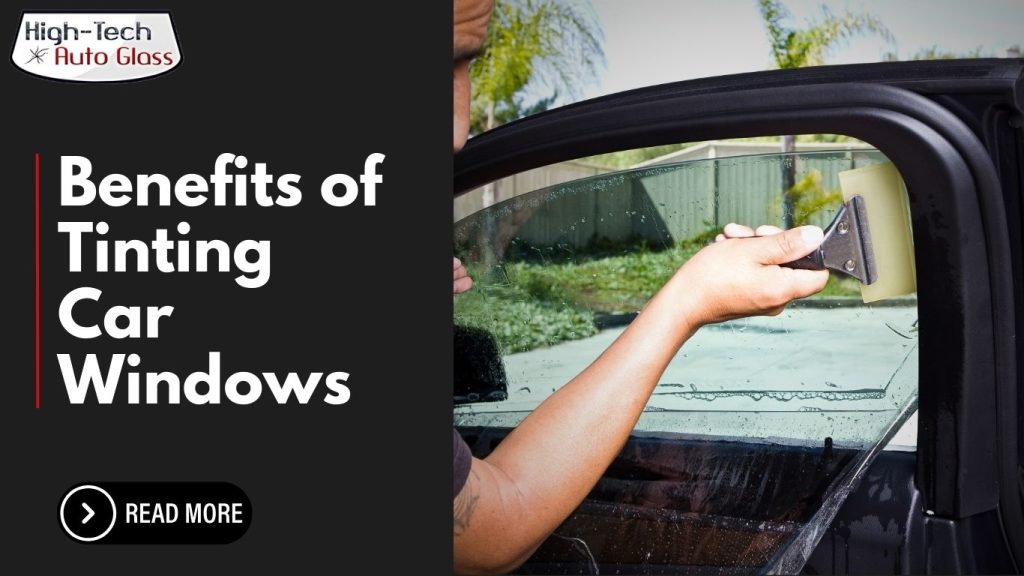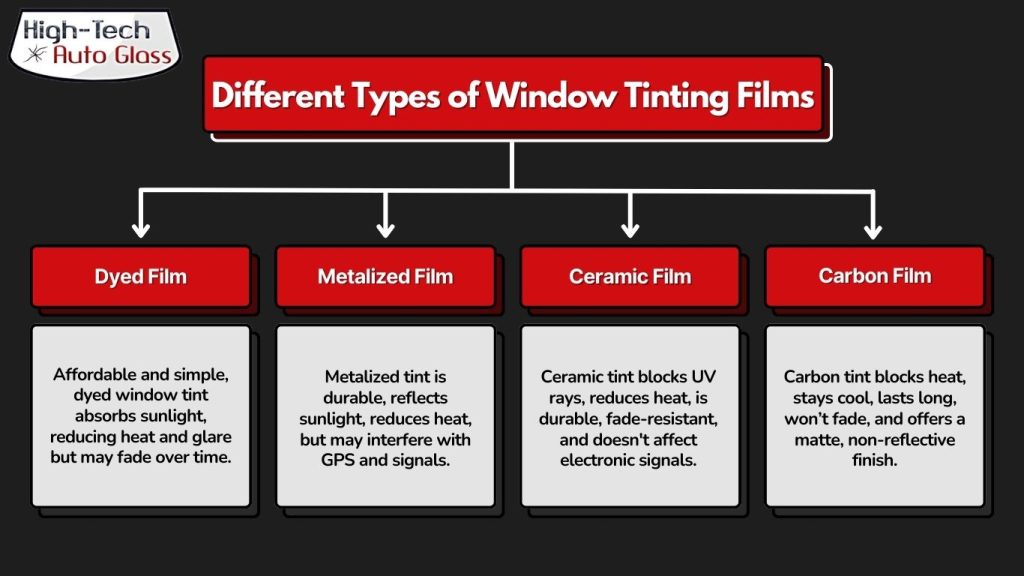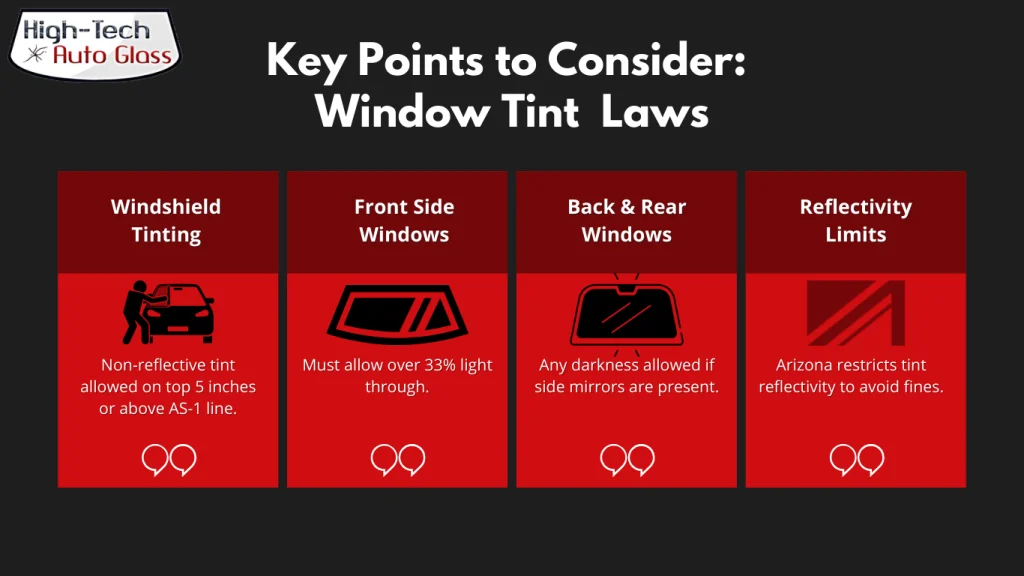Benefits of Tinting Car Windows

Have you ever wondered why so many people choose to tint their car windows? What’s the real purpose behind it? Is it just for aesthetics, or are there practical reasons that make it worthwhile? Are there any laws for tinting car windows? Well, car window tinting goes beyond giving your vehicle a sleek look, it offers many benefits that enhance both comfort and safety.
At its core, window tinting involves applying a thin, transparent film to your car’s windows. This film not only makes your vehicle look more stylish but also provides numerous advantages, like protecting your interior from harmful UV rays, reducing glare while driving, and even improving fuel efficiency by keeping the car cooler. But the big question is, how does all of this work, and what are the key benefits of tinting car windows?
Let’s find out these answers in the article below, where we’ll explore everything from the advantages of tinted windows to legal considerations and more!
Tinting windows is not just about style but also offers practical benefits. With quality car tints, you can improve your vehicle’s appearance while protecting its interior.
What are the Benefits or Advantages of Tinting Car Windows?
When you tint car windows, you reduce heat, enhance privacy, and protect your vehicle’s upholstery. The advantages of tinted glass go beyond aesthetics.
Enhanced Privacy and Security
Cars with tinted windows offer enhanced privacy, making it difficult for outsiders to see inside, which can deter theft.
1. Increased Privacy for Drivers and Passengers
One of the top tinted windows benefits is the privacy they offer. Why do people tint their windows? Many choose window tinting to enjoy more seclusion while driving or parked. It reduces visibility from the outside, allowing you to feel more secure whether you’re commuting or parked in public spaces.
2. Harder for Thieves to Spot Valuable Items
Tinted windows act as a deterrent for potential thieves. Since it’s harder to see inside a vehicle with tinted windows, criminals are less likely to target cars with darkened glass because they can’t easily assess whether there are valuable items inside. This simple modification reduces the risk of theft.
3. Increased Security in Case of Break-Ins
In the event of a break-in, window tint can offer an additional security measure. The film used in window tint for cars helps hold the glass together, making it more difficult to shatter. This means even if someone attempts to break in, they’ll have a harder time gaining access, providing more time to react or for help to arrive.
By improving privacy and adding a level of security, the benefits of tinting car windows go beyond just appearance. Whether you’re concerned about personal safety or protecting valuable items, tinted windows make a noticeable difference.
UV Ray Protection
One of the key benefits of window tinting is its ability to block up to 99% of UV rays, which can prevent skin damage and keep your car cooler.
1. Blocks Harmful UV Rays
One of the biggest benefits of window tinting is its ability to block up to 99% of harmful ultraviolet (UV) rays from the sun. These rays not only increase the temperature inside your car but also pose significant health risks. Prolonged exposure to UV rays can cause skin damage, such as premature aging and even skin cancer.
2. Protection for Skin and Eyes
By reducing UV exposure, tinting car windows helps protect your skin and eyes while driving. Whether you’re on a short commute or a long road trip, window tinting minimizes direct sunlight, reducing your risk of sunburn or long-term skin damage. This is especially important for drivers and passengers who spend a lot of time in their cars.
3. Prevents Interior Fading and Damage
Benefits of window tinting extend beyond personal health to preserving your car’s interior. Constant exposure to sunlight can cause your upholstery, dashboard, and other interior materials to fade and crack over time. Tinted windows help prevent this damage by blocking UV rays, ensuring that your car stays in better condition for longer.
In short, tinting car windows offers essential protection from UV rays, benefiting both your health and your vehicle’s lifespan. This makes window tinting an excellent investment for anyone looking to preserve their car and protect their skin.
Reduced Glare
One of the main benefits of window tinting is its ability to block sunlight and regulate temperature inside your vehicle. But how does window tint work to achieve this?
1. Reduces Glare from Sunlight and Headlights
One of the benefits of tinting car windows is the reduction of glare. Whether it’s the harsh midday sun or the bright headlights of oncoming cars at night, glare can obstruct your vision and make driving uncomfortable. Tinted windows help filter out excessive light, allowing you to see the road more clearly and drive with less strain on your eyes.
2. Safer Driving in Daylight
Glare can be particularly dangerous when driving in bright daylight conditions. It can reduce your reaction time and make it difficult to see obstacles or other vehicles. By tinting car windows, drivers experience less eye strain and improved visibility, which leads to safer driving. Reduced glare helps you stay more focused and comfortable behind the wheel, even on the brightest of days.
The benefits of tinting car windows extend to improved safety by reducing glare. Whether you’re driving under a bright sun or facing headlights at night, tinted windows offer a clear advantage for safer and more relaxed driving.
Interior Preservation
The advantages of tinting car windows include preserving your car’s interior from fading and cracking due to harmful UV rays.
1. Prevents Fading of Seats and Upholstery
Over time, direct sunlight can cause your car’s seats and upholstery to fade, especially if they are made from fabric or leather. Tinted windows act as a shield, reducing the amount of UV light that enters the vehicle, helping to preserve the vibrant color and texture of your car’s interior materials.
2. Protects the Dashboard and Trim from Cracking
Sunlight doesn’t only affect the seats; it can also damage the dashboard and interior trim. Constant exposure to the sun’s heat and UV rays can cause these materials to dry out, crack, or warp. With window tinting, the amount of heat and UV light is significantly reduced, helping to maintain the quality and longevity of your car’s dashboard and other components.
Tinting car windows helps preserve the interior by protecting against fading and cracking, ensuring that your car looks newer for longer. This not only keeps your car comfortable but also helps maintain its value over time.
Heat Reduction and Energy Efficiency
Tinted windows reflect sunlight, reducing the heat inside the car and enhancing energy efficiency.
1. Reduces Heat Build-Up Inside the Car
One of the major benefits of window tinting is its ability to reflect a large portion of sunlight, which helps in significantly reducing the heat inside the car. In hot climates, this is especially beneficial as it prevents the car from becoming unbearably warm when parked in the sun or during long drives. By blocking heat, tinted windows make the interior much cooler and more comfortable for both the driver and passengers.
2. Enhances Driver Comfort
Tinted windows benefits include improved comfort for drivers, particularly in hot regions where cars can heat up quickly. By reflecting heat away from the car, window tinting reduces the interior temperature, allowing for a more pleasant driving experience without feeling overheated. It also prevents the need to constantly seek shaded parking spots, as your car stays cooler even in direct sunlight.
3. Reduces Air Conditioning Use and Improves Energy Efficiency
With less heat entering the car, there’s less need to use the air conditioning as frequently. This reduces the strain on your vehicle’s AC system, leading to better fuel efficiency. Benefits of tinting car windows include lowering your car’s energy consumption and saving on fuel, which is especially advantageous for long-term driving in hot climates.
In short, tinting car windows offers both comfort and energy savings by reducing heat build-up and minimizing the need for air conditioning, making it an efficient choice for drivers in warmer regions.
Improved Fuel Efficiency
By reducing the need for air conditioning, tinted windows help improve your vehicle’s fuel efficiency.
1. Lower Demand on Air Conditioning
When the interior of your car stays cooler due to tinted windows, there’s less need to crank up the air conditioning. This leads to reduced strain on the vehicle’s cooling system, which in turn lowers fuel consumption. Tinted windows are especially beneficial during the summer months or in hot climates, where the use of air conditioning is typically high.
2. Better Fuel Economy
The less your air conditioner has to work, the less fuel your car consumes. Over time, this can lead to noticeable improvements in fuel efficiency. For drivers who spend long hours on the road or live in areas with extreme heat, the benefits of tinting car windows include saving money on fuel. This makes it not only a comfort-enhancing option but also a cost-effective choice for the long term.
In essence, tinted windows benefits extend to improved fuel efficiency by reducing the need for air conditioning, leading to lower fuel consumption and long-term savings for drivers.
Different Types of Window Tinting Films

Dyed Film
- Affordable and simple: Dyed window tint is one of the most cost-effective options available.
- How it works: It uses a layer of dye to absorb sunlight, reducing heat and glare inside the car.
- Durability: While it’s affordable, dyed film may fade over time, especially with prolonged sun exposure.
Metalized Film
- Durability and strength: Metalized window tint is known for its durability and resistance to scratches.
- How it works: Tiny metallic particles reflect sunlight, reducing heat while providing a shiny appearance from the outside.
- Durability: Metalized film is more durable than dyed film, but it may interfere with electronic signals such as GPS and mobile reception.
Ceramic Film
- High performance: Ceramic tint is one of the most effective types of window films available today.
- How it works: Made with ceramic particles, it blocks a significant amount of UV rays and heat without affecting visibility.
- Durability: Ceramic film is highly durable, resistant to fading, and doesn’t interfere with electronic signals, making it a top choice for many.
Carbon Film
- Great for heat insulation: Carbon film contains carbon particles that effectively block infrared light and keep the car cooler.
- How it works: It reduces the amount of heat entering the vehicle without creating a shiny or reflective appearance.
- Durability: Carbon film is long-lasting, won’t fade over time, and offers a matte finish for those looking for a more subtle appearance.
Legal Considerations When Tinting Windows
Car window tinting laws vary across different regions, making it important to understand and comply with local regulations.
1. Varying Tinting Laws
Tinting regulations vary by state and country, often based on how much light must pass through the glass, known as Visible Light Transmission (VLT). Some areas allow darker tints on rear windows but enforce stricter limits on front side windows. Knowing local laws is essential to avoid fines or the need to remove illegal tints.
2. Complying with Local Regulations
Following local window tinting laws is crucial to avoid penalties. Dark tints can impair visibility, especially at night, so always check your area’s rules to stay compliant while benefiting from window tinting.
3. Front Windshield Tinting
Tinting the front windshield is often restricted, with most regions allowing only a light or non-reflective tint on the top strip. Always check local laws before applying tint to your front windshield to ensure safety and legal compliance.

When it comes to windshield tinting laws in Arizona, it’s important to be aware of the specific regulations to avoid any legal issues. Arizona law allows tinting on the top portion of the windshield, but it must not extend below the AS-1 line. For more detailed information about the allowable Visible Light Transmission (VLT) percentages and additional regulations, check out the complete guidelines on Arizona Tinting Laws.
Key Points to Consider:
- Windshield Tinting Restrictions: Only non-reflective tint is allowed on the top 5 inches or above the AS-1 line.
- Front Side Windows: Must allow more than 33% of light to pass through.
- Back and Rear Windows: Can have any darkness, but the vehicle must have side mirrors.
- Reflectivity Limits: Arizona law restricts tint reflectivity, making it essential to follow these guidelines to avoid fines.
While tinting car windows offers many advantages, it’s essential to stay informed about your local laws and regulations to avoid legal issues and ensure safe driving.
DIY vs. Professional Tinting
DIY Tinting:
- Cost-Effective Option: DIY tinting car windows can save you money upfront since you only need to purchase a tint kit. However, the quality of tint and tools may not match professional standards.
- Challenging Application: Learning how to tint windows car can be difficult, often resulting in bubbles, uneven tint, or peeling over time, which diminishes the overall appearance of your vehicle.
Professional Tinting:
- Flawless Finish: Professional tinting ensures precision and quality car tints, applied with specialized tools and expertise. This guarantees a smooth, bubble-free application that enhances the look of your vehicle.
- Long-Lasting Durability: Cars with tinted windows done by professionals typically last longer, as they use high-quality tints that don’t fade or peel, providing lasting protection against UV rays and heat.
Conclusion
Tinting your car windows offers a variety of benefits that enhance your overall driving experience, from improving privacy and blocking harmful UV rays to reducing glare and keeping your car cooler. These advantages not only make your car more comfortable but also help maintain its interior, ensuring it looks better for longer. Whether you choose quality car tints for privacy or protection, cars with tinted windows offer numerous benefits for both comfort and style.
Choosing the right type of window tinting is essential to maximize these benefits. Whether it’s for protection from the sun, improved energy efficiency, or added security, selecting the right tint will ensure long-lasting performance and satisfaction.
In addition to comfort and style, window tinting contributes to the safety and longevity of your vehicle. By reducing heat, glare, and potential damage to your car’s interior, you’ll enjoy a safer, more comfortable ride every time.
At High Tech Auto Glass, we pride ourselves on being the top choice for windshield repair and replacement in Arizona. Specializing in Windshield Replacement Phoenix, we offer expert services designed to ensure your safety and comfort on the road. Whether you need a quick repair or a full windshield replacement, trust our team for fast, reliable, and professional service every time.
Frequently Asked Questions
Can window tinting help reduce energy costs in my vehicle?
Yes, by reducing the amount of heat entering the car, window tinting can lower the demand on your air conditioning, leading to improved fuel efficiency and lower energy costs.
Does tinting affect the resale value of my car?
High-quality window tinting can positively impact the resale value by preserving the interior and improving the overall look of your vehicle.
Can window tinting protect me from shattered glass in an accident?
Yes, window tinting helps hold glass together in the event of a break, minimizing the chances of injury from shattered glass.
Will window tinting fade over time?
Some lower-quality tints may fade with prolonged exposure to sunlight, but high-quality films like ceramic or carbon tints are designed to last longer without significant fading.
Does window tinting block all UV rays?
Most high-quality window tints can block up to 99% of harmful UV rays, providing significant protection for your skin and your car’s interior.
Can I wash my car immediately after window tinting?
It’s recommended to wait a few days before washing your car, especially the windows, to allow the tint to fully cure.
What should I consider before tinting my car windows?
Factors like local tinting laws, your climate, and the type of tinting film should all be considered before installing window tints.
